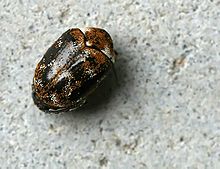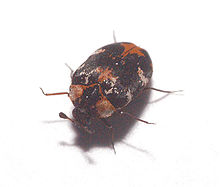en
names in breadcrumbs







Anthrenus is a genus of beetles in the family Dermestidae, the skin beetles. One of several genera of carpet beetles, Anthrenus was historically placed in a subfamily Anthreninae, though presently included in the Megatominae. The genus Neoanthrenus is closely related.
Anthrenus carpet beetles are small beetles a few millimetres long with a rather rounded shape. Their antennae bear small clubs at the end, which are plumper in males than in females. Many have a delicate and rather pretty pattern, with a dark body covered in colorful scales of various brown, tan, red, whitish and grey hues. These scales rub off easily, and old individuals are often partially devoid of them, showing the shining black elytra. A considerable number of subspecies and varieties have been named, but it is questionable whether these are all valid or simply refer to such age-related differences. The massive number of species has been divided into several subgenera, but these are not too firmly established. The small subgenus Helocerus for example is sometimes entirely included in Florilinus. Also, new species are being described every now and then.
These beetles range essentially all over the world; they have even colonized some remote oceanic islands. Most species are harmless pollen-eaters, with the long-haired larvae feeding on a wide range on dead animal or plant matter. This makes them important decomposers, which clean up decaying organisms. Some, however, most notoriously the museum beetle (A. museorum), are significant pests, infesting stored goods and especially biological specimens in museum collections. These species have caused considerable damage to biology by destroying valuable type specimens. Their larvae may cause considerable damage on wool, fur, feathers, and natural history collections.[2]
Anthrenus contains the following species:[3]
 Old varied carpet beetle (A. verbasci) with most scales rubbed off
Old varied carpet beetle (A. verbasci) with most scales rubbed off  Anthrenus larvae feeding on Sceliphron destillatorium specimen
Anthrenus larvae feeding on Sceliphron destillatorium specimen  Anthrenus pimpinellae, probably male
Anthrenus pimpinellae, probably male  common carpet beetle (A. scrophulariae), probably male
common carpet beetle (A. scrophulariae), probably male  museum beetle (A. museorum), male
museum beetle (A. museorum), male Anthrenus is a genus of beetles in the family Dermestidae, the skin beetles. One of several genera of carpet beetles, Anthrenus was historically placed in a subfamily Anthreninae, though presently included in the Megatominae. The genus Neoanthrenus is closely related.
Anthrenus carpet beetles are small beetles a few millimetres long with a rather rounded shape. Their antennae bear small clubs at the end, which are plumper in males than in females. Many have a delicate and rather pretty pattern, with a dark body covered in colorful scales of various brown, tan, red, whitish and grey hues. These scales rub off easily, and old individuals are often partially devoid of them, showing the shining black elytra. A considerable number of subspecies and varieties have been named, but it is questionable whether these are all valid or simply refer to such age-related differences. The massive number of species has been divided into several subgenera, but these are not too firmly established. The small subgenus Helocerus for example is sometimes entirely included in Florilinus. Also, new species are being described every now and then.
These beetles range essentially all over the world; they have even colonized some remote oceanic islands. Most species are harmless pollen-eaters, with the long-haired larvae feeding on a wide range on dead animal or plant matter. This makes them important decomposers, which clean up decaying organisms. Some, however, most notoriously the museum beetle (A. museorum), are significant pests, infesting stored goods and especially biological specimens in museum collections. These species have caused considerable damage to biology by destroying valuable type specimens. Their larvae may cause considerable damage on wool, fur, feathers, and natural history collections.